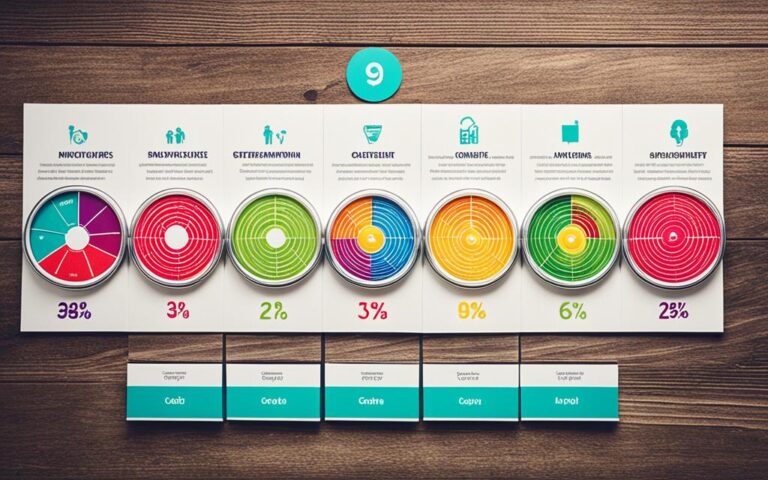Exploring the Benefits of Marketing Automation
Did you know that businesses that implement marketing automation experience a 14.5% increase in sales productivity? That’s a significant impact on the bottom line, and it highlights the power of automation in driving business success. In today’s fast-paced digital landscape, marketing automation is becoming an essential tool for businesses of all sizes, helping them streamline their workflows, improve efficiency, and achieve higher ROI.
Marketing automation offers a wide range of benefits that go beyond simple time savings. By automating processes and tasks, it frees up valuable time for marketing teams to focus on more strategic initiatives. It also plays a crucial role in aligning marketing and sales efforts, resulting in increased conversion rates and improved productivity.
Accurate reporting and personalized marketing strategies are other advantages offered by marketing automation. It enables businesses to track and analyze data effectively, empowering data-driven decision-making. Additionally, marketing automation facilitates the creation of personalized campaigns and messaging, allowing businesses to deliver targeted content to their audience.
With lead scoring capabilities and efficient data management, marketing automation helps businesses nurture leads and identify qualified sales opportunities. It ensures that leads are effectively managed and efficiently handed over to the sales team, leading to improved conversion rates and a more streamlined sales process.
Marketing automation also contributes to scalability and growth. As businesses expand, manual processes become inefficient and difficult to manage. However, with marketing automation, processes can be easily scaled to accommodate growing needs and demands.
In conclusion, marketing automation is a powerful tool that offers numerous benefits to businesses. From increased efficiency and alignment of marketing and sales efforts to improved conversion rates and accurate reporting, the advantages of marketing automation are too significant to ignore. By incorporating marketing automation into their strategies, businesses can optimize their marketing efforts, increase productivity, and drive overall success.
Key Takeaways:
- Implementing marketing automation can lead to a 14.5% increase in sales productivity.
- Marketing automation streamlines workflows, improves efficiency, and enhances ROI.
- It aligns marketing and sales efforts, resulting in increased conversion rates.
- Accurate reporting and personalized marketing strategies are key advantages.
- Marketing automation helps manage and nurture leads effectively.
Efficiency and Time Savings
Marketing automation plays a crucial role in enhancing efficiency and saving time within marketing departments. By automating various tasks and processes, businesses can achieve efficient workflows, increased productivity, and streamlined processes. Unlike traditional manual methods, marketing automation reduces staffing costs and frees up valuable time for more important projects.
With marketing automation, tasks such as social media posting, email nurturing campaigns, blog posting, and landing page creation can be automated, allowing marketing teams to focus on creative work and strategic planning. By eliminating repetitive and time-consuming tasks, automation allows marketers to redirect their efforts towards generating innovative ideas and devising comprehensive strategies to achieve business objectives.
Marketing automation platforms offer an all-in-one solution for managing multiple tasks within the same software. This eliminates the need for switching between various tools and saves time and effort in campaign creation. Marketers can easily streamline their workflows, ensuring a more efficient and seamless process from ideation to execution.
“Marketing automation is a game-changer for businesses looking to optimize their marketing efforts. By automating routine tasks, teams can achieve greater efficiency and focus on strategic initiatives.” – Jane Smith, Digital Marketing Manager at ABC Corporation
Implementing marketing automation not only saves time but also enables marketers to adopt a data-driven approach to decision-making. The platforms provide valuable insights and analytics, helping businesses identify areas for improvement and make informed decisions to achieve better results. This data-driven approach ultimately leads to more efficient processes and improved ROI.
Overall, by leveraging marketing automation, businesses can save time, increase efficiency, and streamline their processes, allowing marketers to concentrate on the creative aspects of their work. The benefits of efficient workflows and increased productivity provided by marketing automation are invaluable in today’s fast-paced business landscape.
Alignment of Marketing and Sales Efforts
Effective collaboration between marketing and sales is crucial for the success of any business. Marketing automation plays a pivotal role in aligning these two departments and driving increased conversion rates.
By utilizing the same marketing automation software, businesses can synchronize their goals, strategies, and metrics, ensuring a cohesive approach. This alignment eliminates silos, streamlines communication, and fosters collaboration between marketing and sales teams.
The use of marketing automation tools enables marketing teams to generate high-quality leads and nurture them throughout the buyer’s journey. Through automated workflows and personalized content, marketers can deliver targeted messages that resonate with potential customers, piquing their interest and moving them further along the sales funnel.
Furthermore, marketing automation provides valuable insights into lead behavior, enabling the sales team to prioritize follow-ups and engage with prospects at the right time. This alignment of efforts ensures that sales reps focus their energy on leads that have the highest potential to convert.
“Marketing and sales alignment is essential for driving revenue growth. By leveraging marketing automation, companies can achieve higher conversion rates and boost overall business performance.”
The close integration of marketing automation with CRM systems allows for seamless data sharing between marketing and sales teams. This real-time visibility into lead engagement ensures more effective communication and collaboration. Sales reps can access valuable prospect information, such as website interactions, email engagement, and content downloads, providing them with crucial insights to tailor their sales conversations to the prospect’s needs.
Ultimately, the alignment of marketing and sales efforts through marketing automation leads to increased conversion rates, shortened sales cycles, and higher revenue.
By adopting marketing automation, businesses can foster collaboration, streamline processes, and maximize the potential of their marketing and sales teams. The result is a harmonious and efficient workflow that drives success and growth.
Key Benefits:
- Enhanced collaboration between marketing and sales teams
- Increased conversion rates through targeted messaging and lead nurturing
- Shortened sales cycles and improved efficiency
- Real-time insights and data sharing for better decision-making
- Maximized revenue growth and business success
Improved Conversion Rates and Lead Management
One of the key benefits of marketing automation is its ability to increase conversion rates and improve lead management. With marketing automation software, businesses can effectively track leads and optimize their conversion rate optimization strategies. By utilizing personalized messaging and content, marketing automation enables businesses to nurture leads and monitor their engagement more efficiently. Additionally, lead scoring capabilities provided by marketing automation platforms notify the sales team when a lead is ready for further engagement, streamlining the lead management process.
Marketing automation software empowers businesses to track and analyze valuable data related to leads and website visitors. Through the retargeting of website visitors, conversion rate optimization can be achieved, ultimately leading to increased conversion rates. This targeted approach ensures that potential customers stay engaged and guided through the sales funnel.
Using marketing automation, businesses can provide personalized messaging and content to their leads based on their behavior and interests. This personalization helps to build stronger relationships with leads and improve the overall customer experience. By tailoring the messaging to meet the specific needs and pain points of leads, businesses can increase the likelihood of conversion.
“Marketing automation allows businesses to nurture leads efficiently, providing relevant and personalized messaging that guides prospects through their buyer journey.”
In addition to lead nurturing, marketing automation software also offers lead scoring capabilities. Lead scoring enables businesses to prioritize leads based on their level of engagement, allowing the sales team to focus on leads that are most likely to convert. This strategic approach to lead management contributes to higher conversion rates and a more efficient sales process.
By implementing marketing automation, businesses can streamline their lead management process, increase their conversion rates, and ultimately achieve better results in their marketing campaigns.
Accurate Reporting and Analytics
Accurate reporting and analytics are essential components of successful marketing automation strategies. With the right marketing automation platform, businesses can simplify the process of tracking and analyzing data, enabling data-driven decision-making and leading to more effective marketing campaigns.
One of the key advantages of marketing automation is the ability to generate automated reports. These reports provide businesses with a high-level overview of their marketing efforts, saving valuable time and resources. With automated reports, marketing teams can quickly assess the overall performance of their campaigns, identify areas for improvement, and make data-driven adjustments.
By accurately tracking and analyzing data, businesses can pinpoint where leads drop off in the lead nurturing or sales process. This valuable insight allows for timely adjustments and improvements to be made, increasing conversion rates and ultimately driving more revenue.
Benefits of Accurate Reporting and Analytics with Marketing Automation:
- Identify Complications: Accurate reporting helps businesses identify any complications or bottlenecks in their marketing processes. By identifying these challenges, teams can make informed decisions to improve performance.
- Optimize Marketing Efforts: With accurate analytics, businesses can gain insights into customer behavior and preferences, allowing for more targeted and personalized marketing strategies. This optimization leads to higher engagement and better results.
- Measure ROI: Accurate reporting and analytics enable businesses to measure the return on investment (ROI) of their marketing campaigns. By tracking the effectiveness of different channels and tactics, organizations can allocate resources more effectively to maximize their ROI.
Implementing marketing automation with accurate reporting and analytics capabilities is crucial for businesses that want to stay competitive in today’s data-driven landscape. By leveraging data insights, companies can make informed decisions, optimize their marketing efforts, and drive growth.
“Accurate reporting and analytics are the backbone of any successful marketing automation strategy. Without accurate data, businesses are left in the dark, making decisions based on assumptions rather than real insights.”
To illustrate the importance of accurate reporting and analytics in marketing automation, take a look at the image below:

As you can see, the image showcases the power of data-driven strategies and the impact they can have on a company’s success. With accurate reporting and analytics, businesses can make data-driven decisions that lead to more effective marketing campaigns and increased revenue.
Personalized Marketing Strategy
Marketing automation plays a crucial role in creating personalized marketing strategies that resonate with customers on a deeper level. With its advanced segmentation capabilities and robust reporting features, marketing automation empowers businesses to execute targeted campaigns across various channels, including social media, search ads, and email. By leveraging these capabilities, businesses can effectively turn web visitors into leads and segment them based on their behavior or characteristics, allowing for tailored lead nurturing and personalized messaging.
One of the key advantages of marketing automation is its ability to enable businesses to deliver the right content to the right audience at the right time. By utilizing behavioral data and demographic information, businesses can create customer segments and curate relevant content that matches their specific needs and interests. This level of personalization fosters a stronger connection with customers, leading to higher engagement and conversion rates.
Marketing automation platforms also excel in lead scoring, a crucial aspect of personalized marketing strategy. Lead scoring allows businesses to prioritize leads based on their level of interest and readiness to make a purchase. By assigning points to specific actions or behaviors, such as downloading a whitepaper or attending a webinar, marketing automation helps identify high-quality leads that are more likely to convert. This enables businesses to target these leads with personalized content and offers to further nurture their interest and move them through the sales funnel.
“Personalization is not just about addressing your audience by their first name; it’s about crafting meaningful experiences that resonate with each individual on a personal level.”
Personalized marketing strategies powered by marketing automation are not only effective in capturing the attention of potential customers but also help build long-term customer loyalty. By consistently delivering tailored content and experiences, businesses can create personalized customer journeys that provide value at every touchpoint. This level of customization helps establish trust, strengthen brand loyalty, and ultimately drives customer satisfaction and repeat business.
In summary, marketing automation is instrumental in implementing personalized marketing strategies that engage and convert customers. With its segmentation capabilities, lead scoring functionalities, and reporting features, marketing automation enables businesses to deliver targeted campaigns that resonate with their audience, foster personalized customer experiences, and drive business growth.
For more insights on the benefits of marketing automation, check out this comprehensive guide.
Data Management and Lead Scoring
In the realm of marketing automation, effective data management is crucial for businesses to track and optimize lead generation activities. Marketing automation platforms play a vital role in simplifying and automating the process of managing and tracking lead data, ensuring accuracy and efficiency.
By leveraging marketing automation, businesses can keep their lead data up to date and easily accessible. The automated nature of these platforms eliminates the need for manual data entry and reduces the risk of human error.
Furthermore, marketing automation platforms allow for streamlined data management, enabling businesses to organize and segment their leads effectively. This segmentation capability enables more tailored and personalized marketing communication, targeting leads based on their specific interests and behaviors.
Lead Scoring for Effective Follow-Up
One of the key features of marketing automation platforms is lead scoring, an essential tool for prioritizing and effectively following up with leads. Lead scoring helps businesses identify leads that are most likely to convert into sales opportunities.
By assigning scores to leads based on their demographic information, engagement level, and behavior patterns, marketing teams can prioritize their efforts and focus on leads with the highest conversion potential. Lead scoring provides vital insights that guide sales teams in reaching out to the most promising leads at the right time, increasing the chances of closing deals.
With marketing automation platforms, lead scoring is an automated process, ensuring that leads are continuously evaluated and scored based on predefined criteria. This automation eliminates the need for manual lead qualification and accelerates the lead management process.
Using marketing automation, businesses can effectively manage and track lead data, ensuring accurate reporting and improved lead management. Lead scoring helps identify the most promising leads, guiding sales teams in their follow-up efforts. With streamlined data management and automated lead scoring, marketing automation platforms enhance marketing and sales alignment, driving better results and optimizing overall lead management processes.
Scalability and Growth
One of the key advantages of implementing marketing automation is the ability to scale processes, allowing businesses to grow and expand without hindrance. Unlike manual processes that rely heavily on individuals, marketing automation platforms provide the necessary framework to easily scale operations as the team and workload increase.
By automating tasks and workflows, businesses can efficiently manage their marketing programs, adapt to changing needs, and meet the demands of a growing customer base. Marketing automation streamlines processes, enabling teams to handle larger volumes of work without sacrificing quality or efficiency.
The scalability of marketing automation also extends to data management. With automation tools, businesses can effectively collect, organize, and analyze customer data, supporting decision-making processes and strategic planning for future growth.
When it comes to business growth, marketing automation plays a crucial role by empowering organizations to optimize their marketing efforts. By leveraging automated workflows and tasks, businesses can allocate resources more effectively, allowing teams to focus on strategic initiatives that drive growth.
Whether it’s nurturing leads through automated drip email campaigns, segmenting and targeting customers with personalized marketing strategies, or tracking and analyzing data for data-driven strategies, marketing automation provides the scalability needed to support business growth.
With marketing automation in place, businesses can streamline their operations, save time and resources, and achieve sustainable growth in a competitive marketplace.
In conclusion, marketing automation offers scalable processes that enable businesses to thrive and expand. By automating tasks, workflows, and data management, organizations can adapt to growth opportunities and drive business growth. Investing in marketing automation sets the foundation for long-term success, allowing businesses to focus on strategic initiatives that fuel growth and achieve their goals.
Learn more about the benefits of marketing automation and how it can help your business scale and grow.
Conclusion
Marketing automation offers numerous benefits to businesses, from increased efficiency and streamlined processes to improved conversion rates and accurate reporting. By leveraging automation technologies, businesses can optimize their marketing efforts and achieve greater success in a competitive marketplace.
One of the key benefits of marketing automation is its ability to align marketing and sales efforts. This alignment leads to increased conversion rates and improved productivity, as both teams work together towards common goals.
Furthermore, marketing automation enables businesses to personalize their marketing strategies and deliver targeted campaigns. By segmenting leads and providing personalized messaging, businesses can nurture leads more effectively and drive higher engagement.
Overall, investing in marketing automation not only provides numerous benefits but also contributes to increased productivity, cost savings, and improved ROI for businesses. It streamlines processes, frees up time, and enhances overall marketing effectiveness, making it a valuable tool for any business looking to succeed in today’s digital landscape.
FAQ
What are the benefits of marketing automation?
Marketing automation provides benefits such as efficient workflows, increased productivity, targeted campaigns, personalized messaging, lead nurturing, data-driven strategies, cost savings, improved ROI, and more. It streamlines processes and frees up time for strategic projects.
How does marketing automation improve efficiency and save time?
Marketing automation automates tasks and processes such as social media posting, email nurturing campaigns, blog posting, and landing page creation. This allows marketing teams to focus on creative work and strategic planning, increasing efficiency and saving time.
How does marketing automation align marketing and sales efforts?
By using the same software for marketing and sales automation, companies can align their goals and efforts. This leads to an increase in sales productivity, a reduction in marketing overhead, and improved overall efficiency.
How does marketing automation improve conversion rates and lead management?
Marketing automation helps increase conversion rates by retargeting website visitors and providing personalized content and messaging. It also aids in lead nurturing and lead scoring, ensuring that leads are targeted with appropriate content and offers.
How does marketing automation provide accurate reporting and analytics?
Marketing automation platforms offer accurate reporting and analytics, simplifying the process of tracking and analyzing data. This allows businesses to identify complications and areas for improvement, improving overall marketing strategies.
How does marketing automation facilitate personalized marketing strategies?
Marketing automation allows businesses to segment leads based on behavior or characteristics and provides targeted campaigns on various channels. This helps businesses tailor their lead nurturing process and provide personalized messaging to improve engagement and conversion rates.
How does marketing automation assist in data management and lead scoring?
Marketing automation platforms help manage and track lead data effectively, automating the process and simplifying data management. Lead scoring features notify the sales team when a lead qualifies as a sales opportunity, optimizing the lead management process.
How does marketing automation support scalability and business growth?
Marketing automation platforms allow businesses to scale and grow without hindrance. By automating tasks and workflows, businesses can easily adapt to changing needs and demands, ensuring marketing programs can support growth and expansion.
What is the overall conclusion about marketing automation?
Investing in marketing automation provides numerous benefits, including increased efficiency, improved conversion rates, accurate reporting, personalized marketing strategies, effective lead management, streamlined data management, scalability, and more. It is an essential tool for businesses looking to optimize their marketing efforts and achieve greater success.







